I News The Essential Daily Briefing
British man, 60, triumphs at 2017 World Memory Championships

Eight-time victor and senior winner of the 2017 World Memory Championships Dominic O’Brien pictured with overall winner Munkhshur Narmandakh
![]() by Katie Grant Sunday December 10th 2017
by Katie Grant Sunday December 10th 2017
Taking a stroll down memory lane?
Dominic O’Brien claimed the 2017 senior world memory champion title this weekend. The Briton, who competed and triumphed at the first ever world memory championships in 1991, retired a decade ago after winning the overall competition eight times. This year he came out of retirement and put his reputation “on the line” to compete at 60 in the seniors category and prove his grey matter was as impressive as ever.
What does the competition involve
Let me jog your memory: entrants from around the world participate across 10 different disciplines; the competitor with the highest cumulative score in all the disciplines is declared the winner. One of the most challenging rounds, “hours cards”, sees participants commit to memory as many randomly shuffled packs of cards as they can. They have two hours to recall them precisely. Championships general secretary Chris Day described it as “a gruelling discipline”. What’s the record? It was set this year by a Mongolian teenager, Munkhshur Narmandakh, who was crowned the overall world memory champion at the event in China. Narmandakh, 18, memorised and recalled the order of 37 decks of cards (1,924 cards). She became the first woman to win the competition and scooped the $10,000 (£7,470) prize money.
How did Mr O’Brien fare?
He set three senior world records, including in the hour cards category; Mr O’Brien, from Dorset, correctly recalled 14.5 decks of cards (754 cards). His power of recall is so strong he is banned from casinos around the world. Contenders from across four age categories compete at the Championships: kids, juniors, adults and seniors.
Different ages but presumably all geniuses?
Apparently not. “You might think they are savants, that they were born with this, but that’s not the case. These are all ordinary guys and gals,” claimed Mr Day. They have simply discovered the sport and “practiced their socks off”. Mr Day added: “Anyone can do it.” Doesn’t your memory fade as you get older? Mr Day pointed out that Mr O’Brien built up a reputation over decades and “put it all on the line” to compete at 60 and prove he is still sharp as a tack. “Memory has nothing to do with age it’s how we use our brains,” Mr Day insisted. “There is hope for us all.”
The 26th World Memory Championships – an historic success!
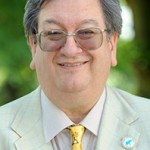 The twenty sixth world memory championship which finished last night in the city of Shenzhen, PRC, will go down in the history of Mind Sports as the best ever….so far. The championship was marked by a number of truly memorable elements…a magnificent $100,000 US dollar prize fund, a shattering of the speed cards record , bringing down the time taken to correctly recall a shuffled deck of cards to a level which nobody had remotely predicted. Finally, most historic of all, the first victory by a female contestant in the twenty six years of the championship. To think that an 18 year old girl might topple the male Titans of memory , would have been virtually inconceivable before the competition began. Now it has happened, proving in the process that Memory Sport truly knows no boundaries of gender, age or physical strength.
The twenty sixth world memory championship which finished last night in the city of Shenzhen, PRC, will go down in the history of Mind Sports as the best ever….so far. The championship was marked by a number of truly memorable elements…a magnificent $100,000 US dollar prize fund, a shattering of the speed cards record , bringing down the time taken to correctly recall a shuffled deck of cards to a level which nobody had remotely predicted. Finally, most historic of all, the first victory by a female contestant in the twenty six years of the championship. To think that an 18 year old girl might topple the male Titans of memory , would have been virtually inconceivable before the competition began. Now it has happened, proving in the process that Memory Sport truly knows no boundaries of gender, age or physical strength.
And then there was the return of that male Titan of memory, Dominic O Brien. Having won the main championship title a record eight times, Dominic now returned to capture his first senior victory.
On the team front China dominated, followed as expected by Mongolia, with their supercharged team of teenage girls. Bronze resulted in a stand off between Algeria and Malaysia, a triumph for the former, whose team will be welcomed by state recognition on their return home.
New World Memory Champion, beating all the men, is the Mongolian teenage girl Munkhshur Narmandakh

She is the FIRST female absolute World Memory Champion!! Munkhshur only started as a competitor one year ago. Since then she has practiced three hour a day and has now become the World Champion!
Silver Medallist – Shi Binbin and Bronze Medallist – Su Zehe of China
Congratulations to our new World Record holders
Binary Digits: Enkhshur Narmandakh (Mongolia). 5445 digits
Hour Numbers: Shi Binbin (China). 3040 numbers
Hour Cards: Munkhshur Narmandakh (Mongolia). 37 decks of cards (1924 cards)
Speed Cards: Zhou Lujian (China). 13.96 seconds
New Senior World Records:
Hours Cards: Dominic O’Brien 14.5 Decks (754 cards)
Spoken Number: Dominic O’Brien 121
Speed Cards: Dominic O’Brien 52.83 seconds
TOP COUNTRY TEAM – China. Algerian team shares team bronze with Malaysia after recount!! TEAM INDIA in 4th place
An overwhelming fact struck me during the championship, that the young people who take up early memory training are forming a race of superhumans…more intelligent, more poised, more self confident and more dynamic. Memory training truly revives the classical ideal of mens sana in corpore sano.
As for global outreach, representatives gathered in Shenzhen from Mexico, USA, Poland, Liechtenstein, France, Belgium, England, Scotland, Algeria, Australia, China, Mongolia, India, Malaysia, Singapore, Vietnam, Taiwan, Hong Kong, Kazakhstan, Russia, a veritable magnet for a mini UN!
The tide of history is on the side of the brilliant young WMSC champions. I now challenge the old guard who were too scared to face the new wave to enter next years 27th World Championship and test their skills against the dynamic younger generation. If they lack the courage, the tsunami of the future will overwhelm their fading laurels…with the exception, of course, of the Immortal Dominic O Brien!
The 26th World Memory Championships has proved, once again, that we continue to underestimate what the brain is capable of. The top story is the new World Record for memorising one randomly shuffled pack of cards has been slashed to just 13.956 seconds by Zhou Lujian of Team China knocking 1.654 seconds from previous World Champion Alex Mullen of the USA. This now becomes the new Guinness World Record.
The World Records that have been broken during in the ten separate memory tests over three days, it is worth remembering that none of the competitors were born with any special memory gifts or have any special qualities. They are all ordinary mental athletes who are using very simple techniques to enable their brains to memorise seemingly impossible amounts of information, and to recall them accurately against the clock. With enough practice, anyone can do the same.
Unlike some physical sports, which can take years to reach world level, in the Mind Sport of Memory we have seen new competitors go from a standing start to becoming a World Champion is under two years!
So what is it all about? It is not a quiz and has nothing to do will cramming your brain full of random facts. Instead it is all about the ability to be presented with new information – such as list of numbers, dates, names and faces, words or playing cards, and seeing how many you can commit to memory in a specific length of time. Then, in a fixed period of time, accurate recalling that same information. It has to be 100% accurate as there are no prizes for forgetting.
The sport, as indeed it is, was founded by Tony Buzan, author and inventor of Mind Mapping, and Raymond Keene OBE, the Chess Grand Master and is now practiced in 62 countries. The highest achieving competitors in the qualifying rounds are eligible to compete in the World Championships.
This year the event took place in China and has in the past been in London, Oxford, Manchester, Bahrain, Kuala Lumpur, Singapore, Hainan, Guangzhou, Croydon, Chengdu and now Shenzhen. Bids are open to host the 27th World Championships in 2018. A great incentive this years was a prize fund of US$100,000 which was distributed around the winners.
The Sport has also attracted Royal patronage. Prince Philipp von und zu Liechtenstein, who graced the front page of the South China Morning Post as soon as he arrive in Shenzhen. granted the first Grandmaster of Memory titles by royal decree at Hanbury Manor UK over two decades ago, thus helping to fuel and launch the now burgeoning world memory movement.
Prince Marek and Princess Petrina Kaspersky of the Polish Royal house, are presidents of the World memory sports Council in Australia and also edit the magazine of The Brain Trust Charity, Synapsia.
This year the competitions was organised by David Zhang, the President for the WMSC Asia Pacific region and was sponsored by Shanghai Wits Publishing Ltd and Guangzhou World Mind Education and Technology Ltd.
Ray Keene OBE Shenzhen 9/12/17
Welcome to the home of Mind Sport of Memory
The Mind Sport of Memory was jointly founded by Tony Buzan and Raymond Keene OBE in 1991 when they staged the very first World Memory Championships. The created a competition format based on ten memory disciplines which is still used today in competitions around the world.
The vision of the World Memory Sports Council is
- to put memory skills training and mental literacy skills at the heart of the education system worldwide
- to make learning mental literacy skills and memory techniques accessible to all irrespective of income, culture, circumstances, location, age, or gender
- to inspire people to take up the sport at every level by the achievements of our elite mental athletes
- to raise the profile of our memory stars and to ensure they receive the international recognition that their achievements so richly deserve
- to promote the highest levels of integrity, ethics, values and sportsmanship throughout the sport
- to attract commercial sponsorship to be able to support the educational and charitable objectives of the organisation
- to grow the sport in all continents and to eventually make it an Olympic sport
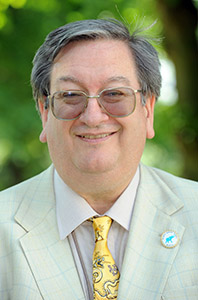
Joint founder of the sport Raymond Keene OBE, has the executive role of Global President of the Sport. Joint founder Tony Buzan continues his role as Ambassador Emeritus for the sport.
There are five separate regions for the sport worldwide, each run by a Regional President. They are: Dominic O’Brien for the UK, Europe and Russia; Dr Manahel Thabet – Middle East and Africa; David Zhang – Asia Pacific Region; Prince Marek Kasperski – Australia and New Zealand; Michael Gelb – North America and Canada; and Dr Jorge Castenada – South American Region. The regional presidents will be responsible for the National Memory Sports Councils in their territories, plus all certification and accreditation.
One of the most successful achievements of the past 25 years of the sport has been the exceptionally high level of arbiting of memory competitions by Chief Arbiter Phil Chambers and his international team of voluntary arbiters worldwide. Some time ago The Guild of Mind Sports Arbiters was formed to train, develop and certify volunteer arbiters. Phil Chambers has now been appointed Life President of G.O.M.S.A in recognition of his outstanding contribution to the sport over the last 25 years.
“This is an exciting moment for the Mind Sport of Memory,” says President Raymond Keene. “The last 25 years has seen interest in competitive memory grow in every continent. The sport now needs to be moved onto a more professional footing to better support our competitors, our competition organisers and fulfil our vision to put memory skills training and mental literacy skills at the heart of the education system worldwide. I am excited to have such a strong line up of Regional Presidents who will be Ambassadors for the sport in their territories and attract the attention of governments, educationalists and commercial sponsors.”
The Brain Trust Charity is the official Charity of the World Memory Sports Council. The mission of the charity is To promote research into study of thought processes, the investigation of the mechanics of thinking, manifested in learning, understanding, communication, problem solving, creativity and decision making; to disseminate the results of such research and study and to promote generally education and training in cognitive processes and techniques and to develop and exploit new techniques in cognitive processes.
The Brain Trust also provides financial encouragement for mental awareness and practical cognitive activities of all kinds.To donate to the Brain Trust Charity or to support its work in any way please feel free to contact info@braintrust.org.uk
Our representation worldwide includes London, Cape Town, Dubai, Hyderabad, Liechtenstein, Mexico City, New York, Santa Fe, Shanghai and Sydney.

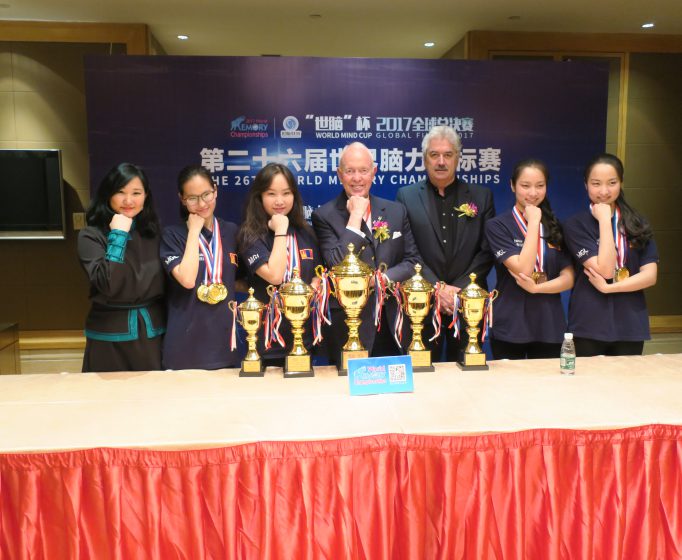
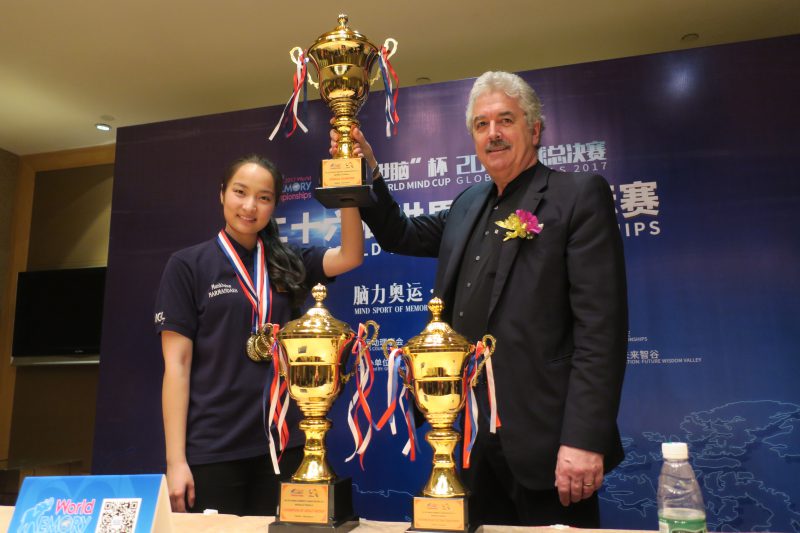




















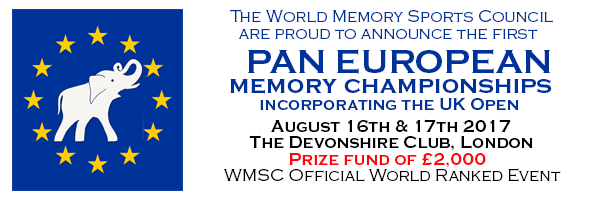
You must be logged in to post a comment.